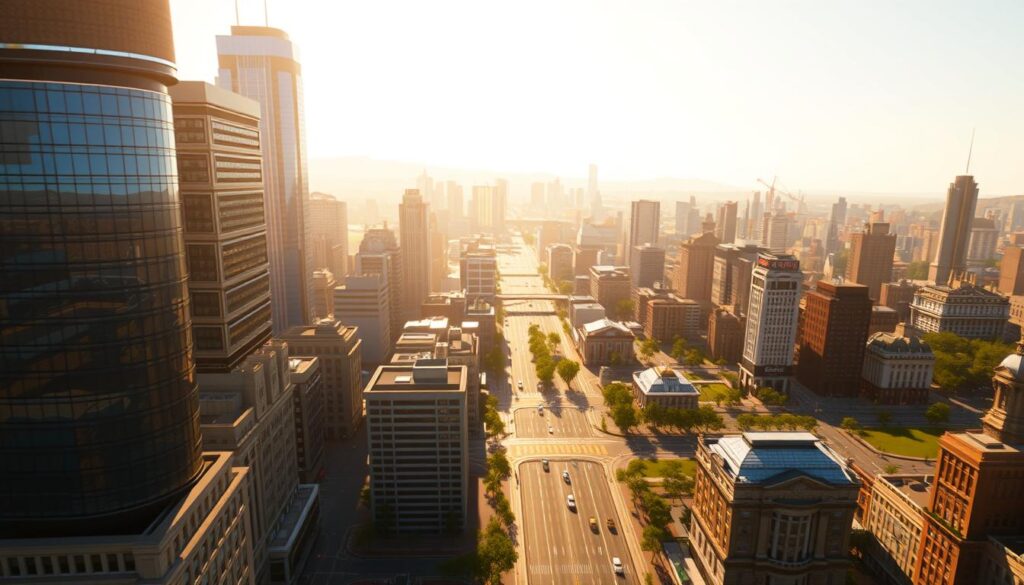Cities: Skylines – Build the Ultimate City from the Ground Up!
Imagine creating and managing your very own metropolis, where you have the power to shape the urban landscape. Cities: Skylines is a city-building simulation that lets you do just that, offering a complex and engaging experience.
Anúncios
This urban planning simulator requires strategic thinking and management skills to build a thriving city. You’ll need to consider factors like zoning, infrastructure, taxes, and public services to create a balanced and prosperous metropolis.
With Cities Skylines, you can unleash your creativity and build the city of your dreams, making it a must-play for fans of city building games and simulation enthusiasts alike.
Introduction to Cities: Skylines
As the mayor of your own city in Cities: Skylines, you’ll face the joys and challenges of urban planning and management. Cities: Skylines puts you in the driver’s seat of a growing city, with all the intricacies that come with it. This city-building simulation game is designed to challenge players to create a thriving metropolis, balancing growth with the needs of citizens.
Cities: Skylines offers a complex and realistic urban environment where strategy and simulation converge. Players must navigate through various aspects of city management, including zoning regulations, transportation systems, and public services. The game is renowned for its depth and the freedom it offers players to experiment with different urban planning strategies.
Anúncios
One of the key aspects of Cities: Skylines is its ability to simulate real-world city management challenges. Players must manage resources, budget, and respond to emergencies and disasters, all while keeping their citizens happy and their city thriving. The game is a strategy simulation that requires careful planning and execution.
Whether you’re a seasoned urban planner or new to city-building games, Cities: Skylines provides an engaging experience that challenges and rewards players. With its robust gameplay mechanics and extensive customization options, it’s a game that appeals to a wide range of players.
Getting Started: Setting Up Your First City
As you dive into Cities: Skylines, the first step towards creating a bustling city is choosing the right settings. This urban planning simulator offers a realistic city sim experience, allowing you to build and manage your city from the ground up.
When starting a new city, it’s essential to begin with a solid plan. This includes selecting the right map and making initial zoning decisions. The city building game provides various maps, each with its unique characteristics and challenges.
Choosing the Right Map
The map you choose can significantly impact your city’s development. Some maps offer more space for expansion, while others may have natural barriers or resources that can affect your city’s growth.
Key considerations when choosing a map include:
- Available land for development
- Access to natural resources like water
- Existing infrastructure or lack thereof
- Potential for expansion and growth
Let’s examine a comparison of different map features to help you make an informed decision.
| Map Features | Map 1: Coastal | Map 2: Inland | Map 3: Mountainous |
|---|---|---|---|
| Land Area | 80% | 90% | 60% |
| Water Access | Yes | No | Yes (River) |
| Natural Resources | Fish, Tourism | Agriculture | Minerals, Tourism |
As shown in the table, each map has its advantages and disadvantages. The coastal map offers access to water and potential for tourism, while the inland map provides more land for agriculture. The mountainous map is rich in minerals but has less available land.
By carefully selecting your map and understanding its features, you can create a thriving city that meets your gameplay goals. Whether you’re aiming for a realistic city sim or a more fantastical city building game, the right start sets the stage for success.
Essential Gameplay Mechanics for Success
The path to creating a prosperous city in Cities: Skylines lies in grasping its fundamental gameplay mechanics. At its core, the game revolves around zoning, infrastructure development, and striking a balance between residential, commercial, and industrial areas.
Zoning is the first step towards building a thriving metropolis. It involves designating areas for different land uses. A well-planned zoning strategy ensures that your city is functional and efficient. For instance, keeping industrial zones away from residential areas can significantly improve the quality of life for your citizens.
Efficient Zoning Strategies:
- Separate residential areas from industrial zones to reduce pollution.
- Locate commercial zones near residential areas for convenience.
- Ensure adequate green spaces for recreation and environmental balance.
Infrastructure development is another crucial aspect. This includes roads, public transportation, and utilities. A robust infrastructure is vital for the smooth operation of your city. Traffic management is a key challenge here, as congested roads can lead to decreased happiness among citizens.
A successful city in Cities: Skylines is one that balances growth with the needs of its citizens. This involves not just building a metropolis, but doing so in a way that is sustainable and beneficial to its inhabitants. As a strategy simulation, the game rewards players who plan carefully and adapt to changing circumstances.
“The art of city planning is not just about building structures, but about creating a living, breathing community that thrives over time.”
To achieve success, players must also manage resources and budget effectively. This includes allocating funds for infrastructure, services, and managing the financial health of the city.
| Aspect | Description | Importance |
|---|---|---|
| Zoning | Land use designation | High |
| Infrastructure | Roads, transportation, utilities | High |
| Resource Management | Managing city finances | High |
By mastering these essential gameplay mechanics, players can build a metropolis that is not only prosperous but also a great place to live.
Notable Features and Customization Options
With a wide range of mods and custom assets available, Cities: Skylines provides a highly personalized city building game experience. Players can tailor their urban planning simulator to fit their unique preferences, enhancing the game’s realism and replayability.
The game’s modding community is one of its most notable features, offering a vast array of mods that can significantly alter or enhance gameplay. From realistic traffic mods to custom maps and themes, the possibilities are endless. For instance, players can explore various maps and themes that add a new layer of depth to the game.
Cities: Skylines also excels as a realistic city sim, allowing players to manage complex city systems, including transportation, zoning, and services. The game’s customization options enable players to create a city that reflects their vision, whether it’s a modern metropolis or a historical town.
The flexibility and depth of Cities: Skylines make it an engaging and challenging urban planning simulator. Players must balance various factors, such as budget, population growth, and environmental impact, to create a thriving city.
Planning Your City Layout Efficiently
Effective city layout planning is essential for managing traffic and ensuring the prosperity of your city in this urban planning simulator.
To build a metropolis that thrives, it’s crucial to separate residential areas from industrial zones to minimize pollution and reduce traffic congestion. Residential areas should be placed near amenities like parks, schools, and healthcare facilities to improve the quality of life for your citizens.
When it comes to traffic management, a well-designed road network is vital. This includes a mix of high-capacity roads like highways, and lower-capacity roads for residential areas. Public transportation systems, such as buses and trains, can also help reduce the reliance on personal vehicles, thereby decreasing congestion.
Efficient Zoning Strategies
Efficient zoning is a cornerstone of successful city planning. By categorizing areas into residential, commercial, and industrial zones, you can create a balanced ecosystem that supports the needs of your citizens while minimizing negative impacts.
| Zone Type | Description | Benefits |
|---|---|---|
| Residential | Areas designated for housing | Provides homes for citizens, can be zoned for different densities |
| Commercial | Areas for businesses and services | Generates revenue, provides employment opportunities |
| Industrial | Areas for manufacturing and production | Produces goods, creates jobs, but requires careful placement to minimize pollution |
By carefully planning your city’s layout and zoning, you can create a thriving metropolis that is both functional and enjoyable for your citizens.
Managing Resources and Budget
To build a prosperous city in Cities: Skylines, you must master the art of resource management and budgeting. Managing your city’s budget is vital, requiring a delicate balance between expenses on infrastructure and services, and revenue from taxes and other sources.
Effective resource management involves allocating funds to various sectors such as transportation, education, and healthcare. Each sector requires careful planning and budgeting to ensure that your city remains prosperous and happy.
Revenue generation is equally important. Taxes are a primary source of income, but you can also generate revenue through other means such as selling city services or leasing city-owned properties.
Balancing your budget is crucial to avoid financial crises. This involves making tough decisions on where to allocate your resources and where to cut back.
| Sector | Recommended Allocation |
|---|---|
| Transportation | 20-25% |
| Education | 15-20% |
| Healthcare | 10-15% |
| Public Services | 10-15% |
By following these guidelines and maintaining a balanced budget, you can ensure the financial stability of your city in Cities: Skylines. Remember, the key to success lies in strategic planning and effective resource management.
Handling Emergencies and Disasters
To build a metropolis that thrives in Cities: Skylines, an urban planning simulator, you must be ready to handle emergencies and disasters that can strike at any moment. Effective traffic management is crucial, as it not only ensures the smooth flow of vehicles but also plays a significant role in emergency response times.
“A well-prepared city is not one that is disaster-free, but one that is ready to respond to disasters,” as echoed by urban planning experts. This quote resonates deeply in Cities: Skylines, where emergency preparedness can make or break your metropolis.
“The greatest glory in living lies not in never falling, but in rising every time we fall.” This philosophy is particularly relevant when dealing with the unexpected challenges that Cities: Skylines throws at players.
When disaster strikes, having a well-planned emergency response system is vital. This includes:
- Establishing emergency services such as fire stations, hospitals, and police departments.
- Ensuring that these services are strategically located to respond quickly to emergencies across your metropolis.
- Investing in infrastructure that supports emergency response, such as roads that can handle emergency vehicles.
Moreover, understanding the types of disasters that can occur and their potential impact on your city is crucial. For instance, earthquakes can damage infrastructure, while floods can inundate residential areas. By understanding these risks, you can take proactive measures to mitigate their effects.
To build a metropolis that is resilient to disasters, consider the following strategies:
- Develop a comprehensive emergency plan that includes evacuation routes and emergency shelters.
- Regularly update and drill your emergency response teams to ensure they are prepared.
- Invest in disaster-resistant infrastructure to minimize damage.
By being prepared and having a robust plan in place, you can ensure that your city in Cities: Skylines remains a thriving metropolis, even in the face of emergencies and disasters.
Expanding Your City: Strategies and Tips
The key to a thriving metropolis in this realistic city sim lies in gradual and well-planned expansion. As you grow your city, it’s essential to balance development with the needs of your citizens.
Gradual expansion allows for better management of resources and infrastructure, ensuring that your city remains sustainable and efficient. This approach enables you to monitor and adjust your city’s growth, making it easier to address any issues that arise.
- Prioritize the development of essential services such as healthcare, education, and public transportation.
- Ensure that your city’s infrastructure can support the growing population.
- Balance residential, commercial, and industrial areas to create a diverse and thriving economy.
In the context of a city building game like Cities: Skylines, expansion is not just about increasing the size of your city; it’s about creating a strategic simulation that is both challenging and rewarding. By focusing on gradual growth and planning, you can create a city that is not only visually appealing but also functional and sustainable.
As you continue to expand your city, remember that each decision has a ripple effect on the overall health and happiness of your citizens. By adopting a thoughtful and strategic approach to expansion, you can build a city that is truly exceptional.
The Role of Modding in Cities: Skylines
One of the key features that set Cities: Skylines apart is its thriving modding community. Mods play a significant role in enhancing the gameplay experience, offering a wide range of enhancements and new features that allow players to build a more complex metropolis.
Mods can significantly alter or enhance gameplay mechanics, such as traffic management, allowing for more realistic simulations. For instance, mods can introduce more sophisticated traffic light systems or alter traffic flow dynamics, making the urban planning simulator more challenging and realistic.

When it comes to building a metropolis, mods can provide additional tools and features that aren’t available in the base game. This can include new building types, improved zoning options, or even entirely new game mechanics that allow players to build a metropolis with unique characteristics.
Popular Mods and Their Features
| Mod Name | Description | Feature Highlights |
|---|---|---|
| Traffic Manager | Enhances traffic management with advanced traffic light control and routing. | Customizable traffic lights, priority routing |
| Realistic Population Growth | Adjusts population growth to be more realistic based on city conditions. | Dynamic population adjustment, realistic growth rates |
| Advanced Building Mod | Allows for more complex building designs and configurations. | Multi-level buildings, advanced customization options |
Mods like these not only enhance the gameplay experience but also provide players with the tools they need to create a more realistic and engaging urban planning simulator. By leveraging the modding community’s creations, players can build a metropolis that is tailored to their preferences, making the game more enjoyable and challenging.
Engaging With Your Community
As you build your city, understanding the needs of your citizens is vital for a thriving metropolis. A city building game like Cities: Skylines requires careful planning and management to ensure that the community’s demands are met.
To engage effectively with your community, you need to provide essential services such as healthcare, education, and transportation. This not only improves the quality of life for your citizens but also contributes to the overall growth and development of your city.
A key aspect of community engagement is understanding the different needs of various demographics within your city. For instance, a realistic city sim like Cities: Skylines allows you to cater to the needs of different age groups and professions.
Community Needs and Services
| Service | Description | Impact |
|---|---|---|
| Healthcare | Provides medical facilities and services | Improves citizen health and happiness |
| Education | Offers schools and educational facilities | Enhances education level and career opportunities |
| Transportation | Develops roads, public transport, and infrastructure | Reduces traffic congestion and improves connectivity |
By balancing these services and understanding the needs of your citizens, you can create a strategy simulation that is both engaging and challenging. This balance is crucial for the long-term success of your city.
In conclusion, engaging with your community is a multifaceted task that requires careful planning, resource management, and a deep understanding of your citizens’ needs. By doing so, you can build a prosperous and thriving city in Cities: Skylines.
Exploring Expansion Packs and DLCs
Expansion packs and DLCs for Cities: Skylines introduce new dimensions to the game, including advanced traffic management features, allowing players to build a metropolis that is both thriving and efficiently managed.
As an urban planning simulator, Cities: Skylines is enriched by these additions, which bring fresh gameplay mechanics and features that enhance the overall gaming experience.
Some of the notable expansion packs include “After Dark,” which introduces nightlife and leisure activities, and “Industries,” which focuses on industrial development and management. Each pack adds a unique layer to the game, enabling players to explore different aspects of city management.
According to a statement from the game’s developers, “Expansion packs are designed to enhance the core gameplay, offering new challenges and opportunities for players to shape their city.”
“The addition of new features and gameplay mechanics through expansion packs and DLCs has significantly enhanced the replayability of Cities: Skylines,” said a community leader.
The variety of expansion packs and DLCs available means that players can customize their Cities: Skylines experience to suit their preferences, whether that involves managing complex transportation systems or developing vibrant city districts.
- New gameplay mechanics
- Enhanced features
- Increased replayability
By incorporating these expansions, players can further immerse themselves in the world of Cities: Skylines, exploring new strategies and techniques to build a metropolis that is both sustainable and prosperous.
Tips for New Players
New to Cities: Skylines? Let’s dive into some essential tips to help you get started on your city-building journey.
When starting out, it’s crucial to understand the basics of city planning in this city building game. Begin by allocating a budget and understanding the different zones: residential, commercial, and industrial. A balanced approach is key to a successful strategy simulation.
Here are some common mistakes to avoid:
- Over-expansion without adequate infrastructure
- Ignoring the needs of your citizens
- Not managing your budget effectively
To create a realistic city sim, focus on:
- Building a diverse economy
- Providing adequate public services
- Planning for future growth

By following these tips, you’ll be well on your way to creating a thriving metropolis in Cities: Skylines. Remember, the key to success lies in planning, budgeting, and adapting to the needs of your citizens.
Conclusion: Your Journey in Cities: Skylines
Cities: Skylines offers a rich and engaging city-building experience that lets you build a metropolis from the ground up. As an urban planning simulator, it challenges you to manage resources, handle emergencies, and optimize traffic management.
As you continue your journey, you’ll uncover the intricacies of urban planning and the satisfaction of watching your city thrive. With a wide range of customization options and mods available, the possibilities are endless.
Whether you’re a seasoned city-builder or just starting out, Cities: Skylines provides a dynamic and immersive experience that will keep you engaged for hours on end. So, get ready to roll up your sleeves, build a metropolis, and master the art of traffic management.










